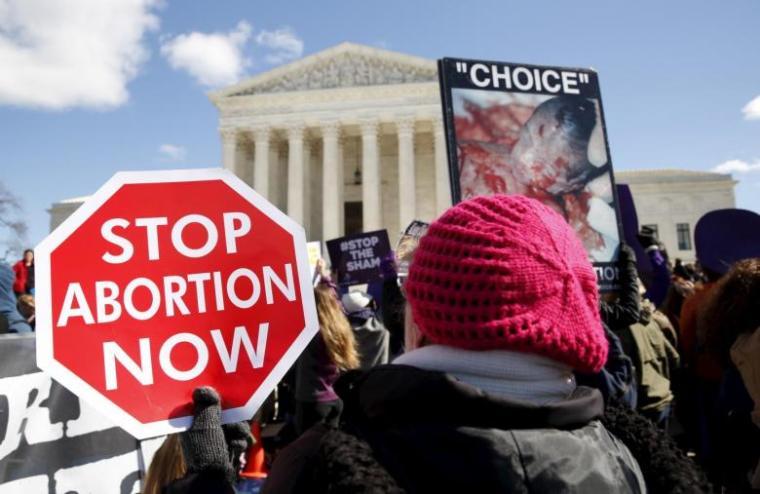Appeals court halts judge's orders to allow undocumented teen to have an abortion

An appeals court has temporarily halted a federal judge's order to allow an undocumented 17-year-old girl in the government's custody to have an abortion.
The pregnant teen, who crossed the border from Mexico illegally last month, is currently held in custody at an Office of Refugee Resettlement (ORR) facility in Houston, Texas.
She claims that she was denied access to abortion, but lawyers for Attorney General Jeff Sessions argued that the teenager did not have a constitutional right to an elective abortion in federal custody unless it was a medical emergency.
U.S. District Judge Tanya S. Chutkan said that she was "astounded" that the government appeared to be presenting the teenager with the options of either voluntarily returning to Mexico to procure the abortion or carry the pregnancy to term.
The judge ordered the government to transport the teenager to obtain an abortion, or allow her guardian to transport her, "promptly and without delay." However, the U.S. Court of Appeals issued a temporary stay on her order on Thursday.
Scott Stewart, a deputy assistant to the attorney general, insisted that pregnant undocumented minors from other countries are not entitled to abortions, adding that opening the door to that right "would significantly infringe on the government's interests in preserving life and protecting national boundaries."
In court filings, the government contended that it has "strong and constitutionally legitimate interests in promoting childbirth, in refusing to facilitate abortion, and in not providing incentives for pregnant minors to illegally cross the border to obtain elective abortions while in federal custody."
The lawsuit was filed by the American Civil Liberties Union (ACLU) against the Department of Health and Human Services (HHS) on Friday on behalf of the 17-year-old immigrant.
Politico reported that the girl, identified in court papers only as Jane Doe, had acquired the money for an abortion and obtained permission from a judge to undergo the procedure without parental consent.
But according to ACLU lawyer Brigitte Amiri, ORR personnel refused to transport her to an abortion facility and sent her to a pro-life crisis pregnancy center instead. The ORR personnel then called the pregnant teen's mother abroad to inform her about the pregnancy.
Amiri contended that the ORR personnel's action was an example of the government's "unconstitutional overreach of power" in a minor's decision to abort her baby.
Chutkan said that the pregnant teen must undergo counseling, as required by state law, on Oct. 19, and obtain the abortion on Oct. 20 or Oct. 21.
Marjorie Dannenfelser, president of the pro-life group Susan B. Anthony List, expressed disappointment with the ruling.
"Today's ruling is outrageous and sets a dangerous precedent," she said. "The U.S. Department of Health and Human Services took a simple position that it would protect the life and dignity of the teenage girl and her unborn child while in their care. Shame on this judge for overruling compassionate care and instead mandating that the U.S. government help facilitate an abortion for a teenage girl," she added.
Within hours of the lower court ruling, Department of Justice lawyers asked that the order be put on hold, arguing that the teenager still has a number of weeks to end her pregnancy. According to Life Site News, a hearing on the case is scheduled to take place on Friday.
 Christians don't have to affirm transgenderism, but they can’t express that view at work: tribunal
Christians don't have to affirm transgenderism, but they can’t express that view at work: tribunal Archaeology discovery: Medieval Christian prayer beads found on Holy Island
Archaeology discovery: Medieval Christian prayer beads found on Holy Island Presbyterian Church in America votes to leave National Association of Evangelicals
Presbyterian Church in America votes to leave National Association of Evangelicals Over 50 killed in 'vile and satanic' attack at Nigerian church on Pentecost Sunday
Over 50 killed in 'vile and satanic' attack at Nigerian church on Pentecost Sunday Ukrainian Orthodox Church severs ties with Moscow over Patriarch Kirill's support for Putin's war
Ukrainian Orthodox Church severs ties with Moscow over Patriarch Kirill's support for Putin's war Islamic State kills 20 Nigerian Christians as revenge for US airstrike
Islamic State kills 20 Nigerian Christians as revenge for US airstrike Man who served 33 years in prison for murder leads inmates to Christ
Man who served 33 years in prison for murder leads inmates to Christ


 Nigerian student beaten to death, body burned over ‘blasphemous’ WhatsApp message
Nigerian student beaten to death, body burned over ‘blasphemous’ WhatsApp message 'A new low': World reacts after Hong Kong arrests 90-year-old Cardinal Joseph Zen
'A new low': World reacts after Hong Kong arrests 90-year-old Cardinal Joseph Zen Iran sentences Christian man to 10 years in prison for hosting house church worship gathering
Iran sentences Christian man to 10 years in prison for hosting house church worship gathering French Guyana: Pastor shot dead, church set on fire after meeting delegation of Evangelicals
French Guyana: Pastor shot dead, church set on fire after meeting delegation of Evangelicals ‘Talking Jesus’ report finds only 6% of UK adults identify as practicing Christians
‘Talking Jesus’ report finds only 6% of UK adults identify as practicing Christians Mission Eurasia ministry center blown up in Ukraine, hundreds of Bibles destroyed: 'God will provide'
Mission Eurasia ministry center blown up in Ukraine, hundreds of Bibles destroyed: 'God will provide' Church holds service for first time after ISIS desecrated it 8 years ago
Church holds service for first time after ISIS desecrated it 8 years ago Burger King apologizes for 'offensive campaign' using Jesus' words at the Last Supper
Burger King apologizes for 'offensive campaign' using Jesus' words at the Last Supper Uganda: Muslims abduct teacher, burn him inside mosque for praying in Christ’s name
Uganda: Muslims abduct teacher, burn him inside mosque for praying in Christ’s name